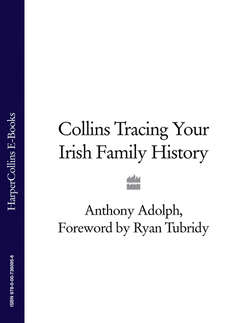Читать книгу Collins Tracing Your Irish Family History - Ryan Tubridy, Anthony Adolph - Страница 61
Colonisation of America
ОглавлениеAccording to The Voyage of Saint Brendan, St Brendan, who was from Munster, sailed west in the 6th century AD and landed in ‘a spacious land with apple trees bearing fruit…they took as many of the apples as they wanted and they drank from springs, and then for forty days they wandered over the land but they could not find an end to it.’ Examining the legend in Land to the West (Collins, 1963), Geoffrey Ashe concluded that, whilst the legend could not be proved definitively, it could well be correct.
After its rediscovery by Columbus in 1492, the English made several failed attempts to colonise North America, until Virginia was established in 1607. Many records of early settlers, including their near-perpetual disputes with London, are in the published State Papers (Colonial) series. The practice of sending ‘rogues, vagabond and sturdy beggars’ to the Americas, initially the West Indies, started in 1597. Cromwell sent many of his opponents there in the 1650s, to work as labourers or, really, slaves. The Transportation Act (1717) regularised the system, and by 1770 some 30,000 people, a third of whom were Irish, had been sent to the Americas. Indeed, one of North America’s grievances, that led to the Revolutionary War of 1773–84, was that they had become a dumping ground for convicts. Many Irish immigrants – from both free and convict backgrounds – were, understandably, on the revolutionary side: 13 of the Declaration of Independence’s signatories, along with the man who printed it, had Irish roots.
By 1790, the USA numbered 3 million people, of whom 44,000 were Irish-born, 150,000 were of Irish parentage, and an unknown number more had earlier Irish roots. The Great Famine caused a huge population movement from Ireland to America. Because they brought disease with them, Irish immigrants weren’t always welcome: New York’s Staten Island quarantine station was attacked and burned down by angry neighbours in 1858.
